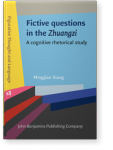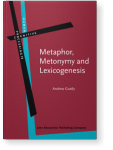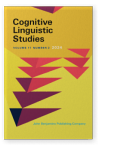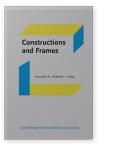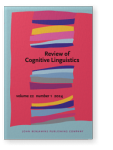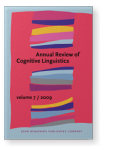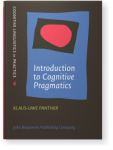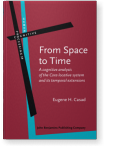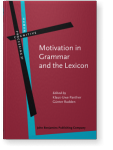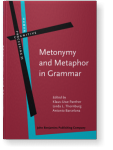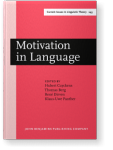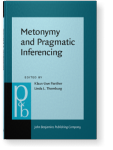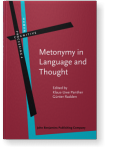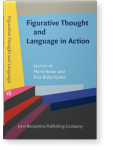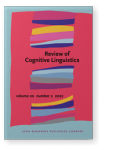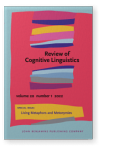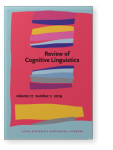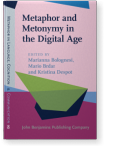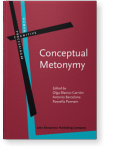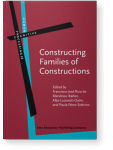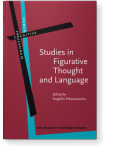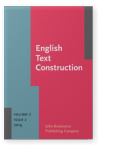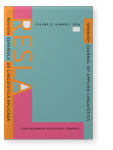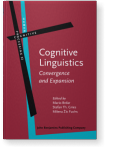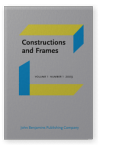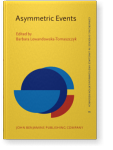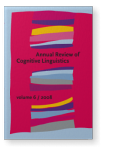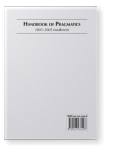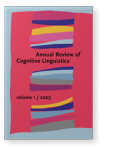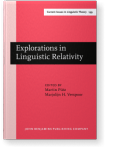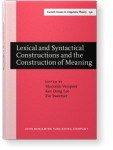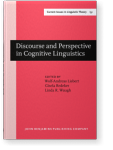Klaus-Uwe Panther
List of John Benjamins publications for which Klaus-Uwe Panther plays a role.
Book series
ISSN 2405-6944
Journals
ISSN 2213-8722 | E-ISSN 2213-8730
ISSN 1876-1933 | E-ISSN 1876-1941
ISSN 1877-9751 | E-ISSN 1877-976X
Yearbook
ISSN 1572-0268 | E-ISSN 1572-0276
Introduction to Cognitive Pragmatics
Klaus-Uwe Panther
[Cognitive Linguistics in Practice, 4] 2022. xxiii, 283 pp.
Subjects Cognition and language | Cognitive linguistics | Discourse studies | Pragmatics | Theoretical linguistics
From Space to Time: A cognitive analysis of the Cora locative system and its temporal extensions
Eugene H. Casad
[Human Cognitive Processing, 39] 2012. xxvii, 263 pp.
Subjects Cognitive linguistics | Historical linguistics | Languages of North America | Theoretical linguistics
Motivation in Grammar and the Lexicon
Edited by Klaus-Uwe Panther and Günter Radden
[Human Cognitive Processing, 27] 2011. vii, 306 pp.
Subjects Cognition and language | Cognitive linguistics | Semantics | Syntax
Metonymy and Metaphor in Grammar
Edited by Klaus-Uwe Panther, Linda L. Thornburg and Antonio Barcelona
[Human Cognitive Processing, 25] 2009. xiii, 423 pp.
Subjects Cognitive linguistics | Semantics | Syntax | Theoretical linguistics
Motivation in Language: Studies in honor of Günter Radden
Edited by Hubert Cuyckens, Thomas Berg, René Dirven † and Klaus-Uwe Panther
[Current Issues in Linguistic Theory, 243] 2003. xxvi, 403 pp.
Subjects Cognition and language | Cognitive linguistics
Metonymy and Pragmatic Inferencing
Edited by Klaus-Uwe Panther and Linda L. Thornburg
[Pragmatics & Beyond New Series, 113] 2003. xi, 280 pp.
Subjects Cognitive linguistics | Pragmatics
Metonymy in Language and Thought
Edited by Klaus-Uwe Panther and Günter Radden
[Human Cognitive Processing, 4] 1999. vii, 410 pp.
Subjects Cognition and language | Cognitive psychology | Discourse studies | Pragmatics
2022 Physical and communicative force in Caused-Motion constructions: What they entail and what they implicate Figurative Thought and Language in Action, Brdar, Mario and Rita Brdar-Szabó (eds.), pp. 141–164 | Chapter
Folk models of “mere” talk and “real” action shape the inferential properties of Transitive Caused-Motion (TCM) constructions with a human Patient as direct object. Physical action verbs like force into/out of semantically entail motion of the Patient into/out of a location. In contrast,… read more
2022 Attribute transfer: The figurative interpretation of shifted modifiers Living Metaphors and Metonymies, Brdar, Mario and Rita Brdar-Szabó (eds.), pp. 130–155 | Article
The rhetorical trope hypallage, here called Attribute Transfer (AT), has been exploited artistically and creatively since antiquity in poetic and narrative discourse, but it is also used in ordinary language. This study focuses on modifier-noun constructions in which the prenominal modifier… read more
2019 M. Brdar. Metonymy and word-formation: Their interaction and complementation Review of Cognitive Linguistics 17:2, pp. 537–543 | Review
2019 Chapter 7. Figurative reasoning in hedged performatives Metaphor and Metonymy in the Digital Age: Theory and methods for building repositories of figurative language, Bolognesi, Marianna, Mario Brdar and Kristina Š. Despot (eds.), pp. 175–198 | Chapter
This chapter combines a cognitive linguistic and a pragmatic approach to a specific class of speech acts known as hedged performatives, such as I can offer you a five-year contract, which, despite the modal hedge can on the illocutionary verb offer, conventionally counts as an offer. We demonstrate… read more
2018 Chapter 5. What kind of reasoning mode is metonymy? Conceptual Metonymy: Methodological, theoretical, and descriptive issues, Blanco-Carrión, Olga, Antonio Barcelona and Rossella Pannain (eds.), pp. 121–160 | Chapter
In this chapter we present new arguments for a conception of metonymy as a contingent, i.e. defeasible, inferential relation between a source and a target sense within the same conceptual frame. Some scholars have raised objections against our approach to metonymy, claiming that there exist… read more
2017 Chapter 4. The role of inferencing in the interpretation of two expressive speech act constructions Constructing Families of Constructions: Analytical perspectives and theoretical challenges, Ruiz de Mendoza Ibáñez, Francisco José, Alba Luzondo Oyón and Paula Pérez-Sobrino (eds.), pp. 109–134 | Chapter
We analyze two illocutionary constructions, viz. an autonomous complement clause construction, instantiated by That it should come to this!, and a wh-interrogative construction, such as What do think you are doing? Both constructions convey emotive and evaluative senses and have a factual… read more
2017 Chapter 1. Exploitingwh-questions for expressive purposes Studies in Figurative Thought and Language, Athanasiadou, Angeliki (ed.), pp. 18–40 | Chapter
This chapter offers a conceptual-pragmatic analysis of the constructionWh-x do you think [
complement clause
…], which exhibits the morphosyntactic form ofwh-interrogative sentences and may indeed be used with a question meaning,… read more
2014 ‘Author (date)’ constructions in academic discourse English Text Construction 7:2, pp. 215–248 | Article
This article elucidates the semantics and pragmatics of a genre-specific nominal pattern with a definite referring function, the ‘Author (date)’ construction, which is widely used in scientific discourse. We investigate the conceptual structure and pragmatic use of this construction in terms of… read more
2014 Metonymy and the way we speak Revista Española de Lingüística Aplicada/Spanish Journal of Applied Linguistics 27:1, pp. 168–186 | Article
In this article we investigate correlations between semantically equivalent expressions (organized in manner scales according to the formal properties of length, prosodic prominence, and grammaticalization) and their varying potential to trigger a certain metonymic interpretation. We focus on… read more
2012 Editors’ preface From Space to Time: A cognitive analysis of the Cora locative system and its temporal extensions, Casad, Eugene H., pp. xxi–xxiv | Miscellaneous
2011 Introduction: Reflections on motivation revisited Motivation in Grammar and the Lexicon, Panther, Klaus-Uwe and Günter Radden (eds.), pp. 1–26 | Article
2011 Emotion and desire in independent complement clauses: A case study from German Cognitive Linguistics: Convergence and Expansion, Brdar, Mario, Stefan Th. Gries and Milena Žic Fuchs (eds.), pp. 87–114 | Article
We advocate the use of theoretical tools from both cognitive linguistics and contemporary pragmatics to analyze complement clause constructions that are syntactically dependent but independent in terms of their illocutionary force, as exemplified in English by That it should have come to this! Such… read more
2009 Introduction: On figuration in grammar Metonymy and Metaphor in Grammar, Panther, Klaus-Uwe, Linda L. Thornburg and Antonio Barcelona (eds.), pp. 1–44 | Miscellaneous
2009 From syntactic coordination to conceptual modification: The case of the nice and Adj construction Constructions and Frames 1:1, pp. 56–86 | Article
The present article investigates a construction that displays a “mismatch” between form and content/function, instantiated by expressions like nice and comfy/clean/warm. This nice and Adj pattern has a “literal” transparent meaning, which corresponds to its coordinative syntax, but it is on its… read more
2009 Aspect and metonymy in the French passé simple Metonymy and Metaphor in Grammar, Panther, Klaus-Uwe, Linda L. Thornburg and Antonio Barcelona (eds.), pp. 177–195 | Article
2008 11. Relating participants across asymmetric events: Conceptual constraints on obligatory control Asymmetric Events, Lewandowska-Tomaszczyk, Barbara (ed.), pp. 209–225 | Article
This chapter discusses a specific type of asymmetric events, namely a configuration where a non-expressed participant in a subordinate event must be identical with a participant in the superordinate event of which it is a part. The phenomenon is known as “obligatory control” in generative grammar… read more
2008 A prototype approach to sentences and sentence types Annual Review of Cognitive Linguistics: Volume 6, Ruiz de Mendoza Ibáñez, Francisco José (ed.), pp. 83–112 | Article
This paper proposes a new solution to the age-old problem of defining the sentence and sentence types. Arguing against traditional definitions, we propose that the category SENTENCE exhibits a complex prototypical structure on the levels of morphosyntactic form, conceptual content, and pragmatic… read more
2005 Metonymy Handbook of Pragmatics: 2003–2005 Installment, Östman, Jan-Ola and Jef Verschueren (eds.), pp. 1–14 | Article
2003 Review of Ruiz de Mendoza Ibáñez & Otal Campo (2002): Metonymy, Grammar, and Communication Annual Review of Cognitive Linguistics: Volume 1, Ruiz de Mendoza Ibáñez, Francisco José (ed.), pp. 276–288 | Review
2003 Metonymies as natural inference and activation schemas: The case of dependent clauses as independent speech acts Metonymy and Pragmatic Inferencing, Panther, Klaus-Uwe and Linda L. Thornburg (eds.), pp. 127–147 | Article
2003 Introduction: On the nature of conceptual metonymy Metonymy and Pragmatic Inferencing, Panther, Klaus-Uwe and Linda L. Thornburg (eds.), pp. 1–20 | Miscellaneous
2000 Why we subject incorporate (in English): a post-Whorfian view Explorations in Linguistic Relativity, Pütz, Martin and Marjolijn H. Verspoor (eds.), pp. 319 ff. | Article
1999 Introduction Metonymy in Language and Thought, Panther, Klaus-Uwe and Günter Radden (eds.), pp. 1 ff. | Miscellaneous
1999 An Account of Implicit Complement Control in English and German Lexical and Syntactical Constructions and the Construction of Meaning: Proceedings of the bi-annual ICLA meeting in Albuquerque, July 1995, Verspoor, Marjolijn H., Kee Dong Lee and Eve Sweetser (eds.), pp. 417 ff. | Article
1999 The Potentiality for Actuality Metonymy in English and Hungarian Metonymy in Language and Thought, Panther, Klaus-Uwe and Günter Radden (eds.), pp. 333 ff. | Article
1997 Speech Act Metonymies Discourse and Perspective in Cognitive Linguistics, Liebert, Wolf-Andreas, Gisela Redeker and Linda R. Waugh (eds.), pp. 205 ff. | Article

